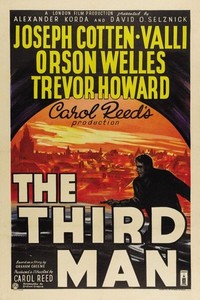
The Third Man (1949)
The 3rd Man

Raiting: ![]() 8,1 /10
8,1 /10
Genre: Filmnoir
Director: Carol Reed
Stars: Joseph Cotten, Orson Welles and Alida Valli
Country: United Kingdom
Release date: 31 August 1949
Length: 104 minutes


Raiting: ![]() 8,1 /10
8,1 /10
Genre: Filmnoir
Director: Carol Reed
Stars: Joseph Cotten, Orson Welles and Alida Valli
Country: United Kingdom
Release date: 31 August 1949
Length: 104 minutes